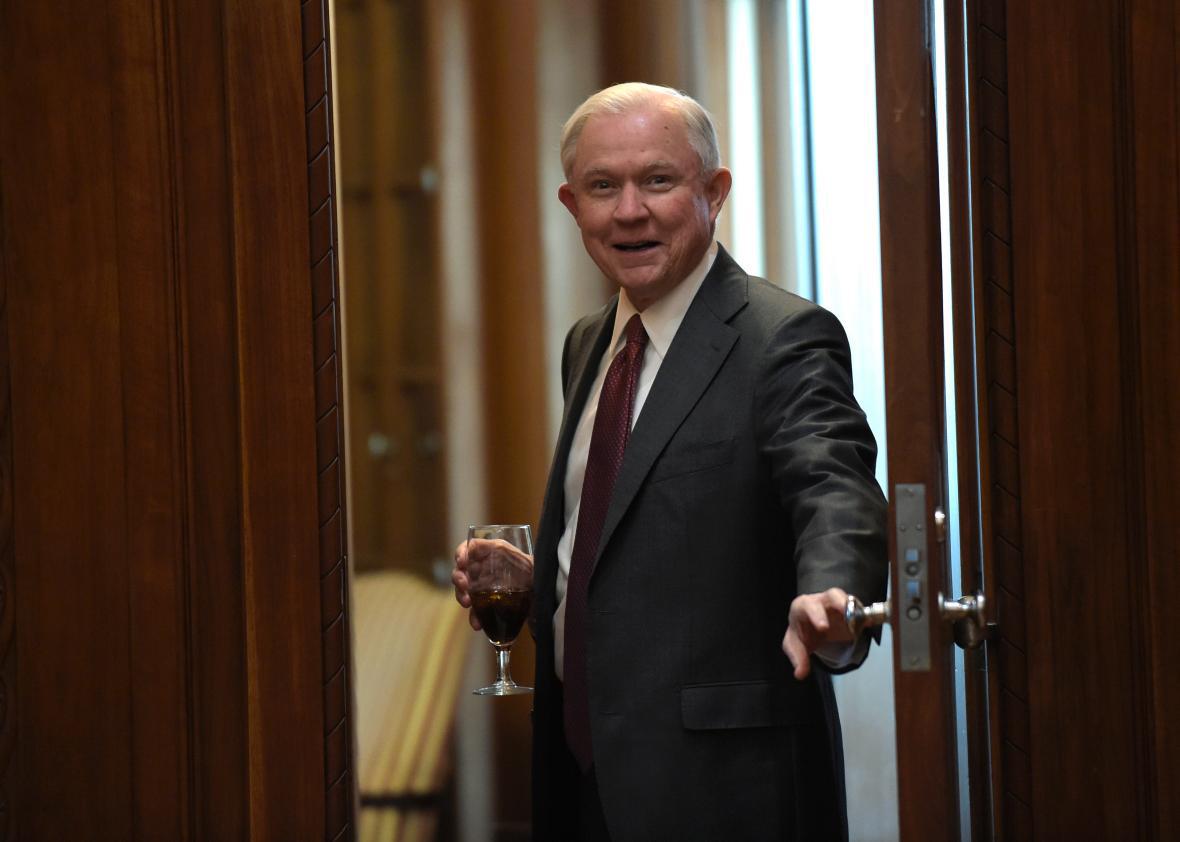Late last month, a group of 25 conservatives sent an open letter to Attorney General Jeff Sessions in which they implored him to bring long-needed reforms to the DOJ’s Civil Rights Division. Among their suggestions: put an end to the division’s obsession with protecting the rights of minorities and “return to race-neutral Voting Rights Act enforcement.” The letter also recommended granting political appointees—the officials in the DOJ’s so-called front office—more power to decide who works in the division and minimizing the role of career attorneys “who are reliably opposed to President Trump’s agenda.”
The letter, whose signatories included a pair of prominent officials from George W. Bush’s Justice Department, inspired eye rolls and indignation in the civil rights community, and underscored the sharp division between the career attorneys in the Civil Rights Division and their new, Trump-approved bosses. The letter also came off as disingenuous. Though it ostensibly demanded an end to politicized hiring practices—the authors cited a 2013 inspector general’s report in arguing that the Obama-era policy of prioritizing job applicants with a “demonstrated commitment to civil rights” had made it so only “employees of left-wing groups” got hired—it seemed to envision the exact opposite: a systematic effort to fill the division’s ranks with right-wing lawyers who would enthusiastically enable the policy goals set forth by Trump and Sessions.
On Tuesday morning, a brigade of high-profile progressive groups returned fire, sending their own letter to the attorney general in which they reminded him that it’s illegal to consider “actual or perceived political affiliation” while making personnel decisions. The letter—which was signed by the ACLU, Citizens for Responsibility and Ethics in Washington, the Lawyers’ Committee for Civil Rights Under Law, and a new team of former Obama attorneys called United to Protect Democracy—makes reference to a dark period in DOJ history, when a George W. Bush-era political appointee named Bradley Schlozman carried out a brazenly partisan campaign to hire conservatives into the Civil Rights Division and to marginalize the liberals among the career staff.
Emails, voicemails, and interviews that were published as part of a damning 2008 report by the DOJ’s inspector general and Office of Professional Responsibility revealed that Schlozman had openly discussed his antipathy toward “crazy libs” and his desire to free up space in the Civil Rights Division for “good Americans.” In one voicemail from February 2006, Schlozman told a colleague, “I just want to make sure we don’t start confining ourselves to, you know, politburo members because they happen to be a member of some, you know, psychopathic left-wing organization designed to overthrow the government.” Three years earlier, he had emailed a different colleague to say he had just spoken with a prospective hire, verified “his political leanings,” and concluded “he is a member of the team.” In a 2004 email, he declined an invitation to lunch by saying, “Unfortunately I have an interview at 1 with some lefty who we’ll never hire but I’m extending a courtesy interview as a favor.”
In June 2006, after he was moved out of the DOJ’s main office and into the U.S. Attorney’s Office in the Western District of Missouri, Schlozman told a friend he was enjoying his new job, but that “bitchslapping a bunch of [Division] attorneys really did get the blood pumping and was even enjoyable once in a while.”
Though Schlozman was never prosecuted, the IG’s report concluded that his conduct violated the Civil Service Reform Act, a federal law which holds that “employees and applicants for employment should receive fair and equitable treatment in all aspects of personnel management without regard to political affiliation.” In the letter sent to Sessions on Tuesday, progressives underscored the importance of adhering to this law in maintaining the credibility of the DOJ and the Civil Rights Division in particular.
The signatories also suggested—with a conspicuous cc list that included the Office of the Inspector General, the Office of Professional Responsibility, and the heads of both Congressional Judiciary Committees—that they’ll be looking out for any moves from the Schlozman playbook.
It would be naïve to think a strongly worded letter could spook Sessions and his fellow political appointees into leaving the Civil Rights Division’s career attorneys alone and allowing them to pursue the kinds of cases they did under President Obama. That’s not going to happen, and it’s not clear that it should: As the saying goes, elections do have consequences, and if the new administration doesn’t believe in, say, opening federal investigations into troubled police departments, then they can’t be expected to do so.
In other words, there should be a way for the people running Trump’s DOJ to pursue their enforcement priorities without improperly politicizing the agency. But it’s unclear whether that’s possible in practice, or where it leaves the hundreds of dedicated civil rights lawyers who joined the DOJ because they wanted to do the kinds of work the new administration doesn’t seem to believe in.
The message Sessions is likely to take away from the letter he received today—assuming he reads it—is that the work of reshaping the DOJ to reflect his ideology will require subtlety, wiles, and a heap of plausible deniability. If the organizations that signed the letter are serious about stopping him, that’s the kind of playbook they should be getting ready for.
